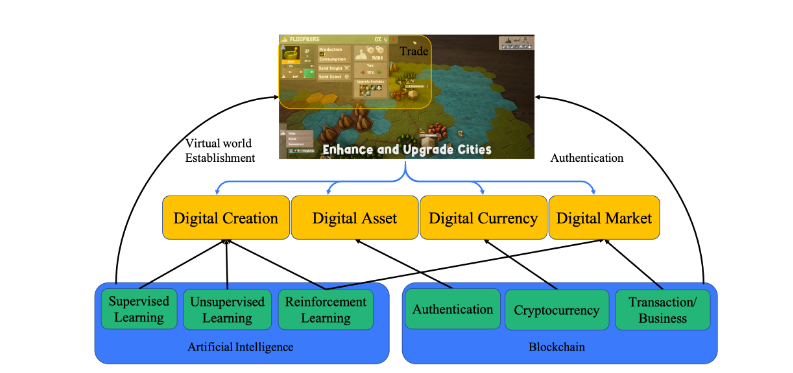An open and fair Metaverse will likely need a Metaverse of its own — an interdisciplinary community of academics and entrepreneurs who can support the vast collection of technologies that will support the Metaverse, according to a group of researchers. Artificial Intelligence (AI) and Blockchain are two specific technologies that will create opportunities — and challenges — in the Metaverse, added the researchers.
In a survey posted on the preprint server ArXiv, the researchers report on the fusing of Blockchain and AI with the Metaverse. The Metaverse will likely not exist without the two, the researchers report.
AI and machine learning are a broad terms that cover a spectrum of computer technologies and techniques, including several that can — and will, the researchers argue — be used in the Metaverse. Avatar and non-player characters (NPC) rely heavily on AI technologies, for example.

They write: “The state-of-the-art AI studies focus on machine learning, deep learning, and reinforcement learning in the fields including computer vision, decision-making, natural language process (NLP). Intuitively, breakthroughs of artificial intelligence in the real world motivate people to use it to realize the metaverse.”
While AI will enhance experience in the Metaverse, ethical issues and technical challenges that have dogged AI in the real world will likely follow the technology into the virtual world.
The researchers write: “While current AI technologies are just at the stage where people tell the machine to do specific tasks instead of enabling the machine to learn to learn automatically. Most learning tasks are only suitable for the closed static environment and have poor robustness, poor interpretability that can not satisfy the requirement of availability, robustness, interpretability, and adaptability in an open and dynamic environment.”
Blockchain, which the researchers define as Blockchain as a decentralized ledger without a centralized authority, is a key part of creating the Metaverse, maintaining security and rewarding its founders and members. Here, the researchers frame Blockchain-related issues with several critical questions:
- Can the existing real-world NFT ecosystem adapt to the high transaction volumes in metaverse?
- What rules does metaverse require to achieve a healthy digital blockchain-empowered market and business?
- Is the application model of the real-world blockchain able to be directly transplanted to metaverse?
- Does metaverse need new blockchain platforms and consensus mechanisms?
The researchers also wonder whether users will have their privacy and security ultimately protected in the Metaverse.
Rather than come to conclusions, academic surveys, such as this one, are meant to examine current trends, identify opportunities and raise questions. However, the researchers do see a role for a community response, of sorts, to the opportunities and challenges of creating the Metaverse. They also hope the study can help guide those collaborations.
“Further exploitation and interdisciplinary research on the fusion of AI and Blockchain towards metaverse will definitely require collaboration from both academia and industries,” they write.” We wish to see that our survey can help researchers, engineers, and educators build an open, fair, and rational future metaverse.
The research team includes Qinglin Yang, of School of Intelligent Systems Engineering, and Yetong Zhao, Huawei Huang and Zibin Zheng, of the School of Computer Science and Engineering, all of the Sun Yat-sen University.
For more market insights, check out our latest Digital Twin news here.













